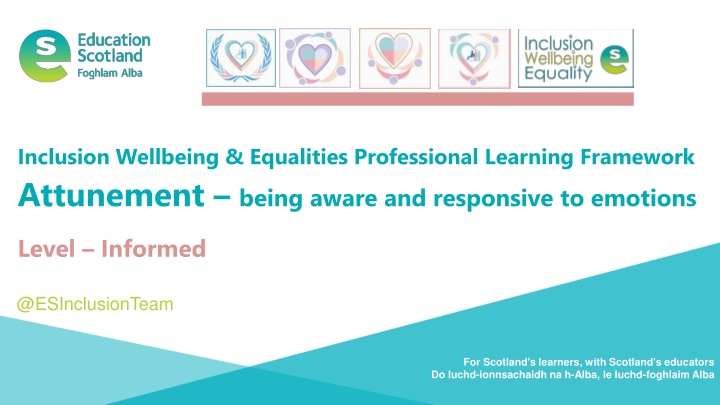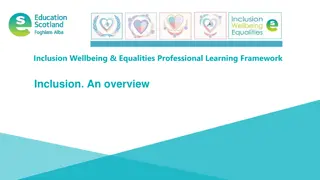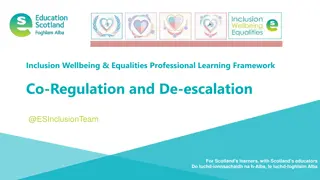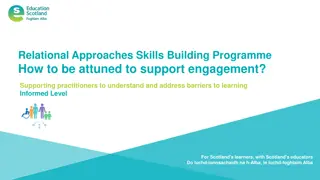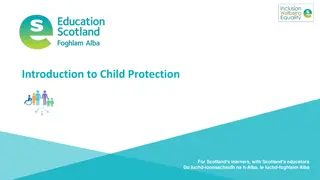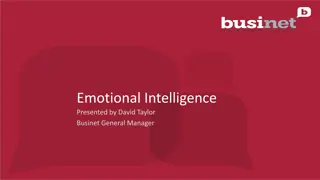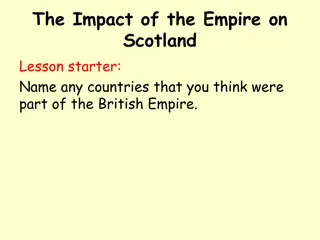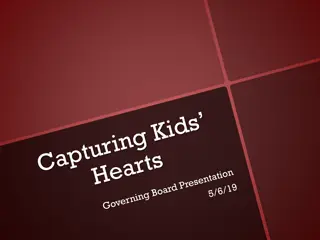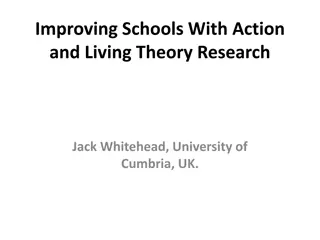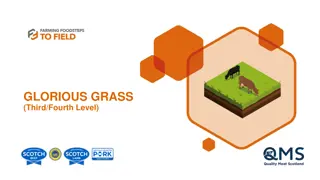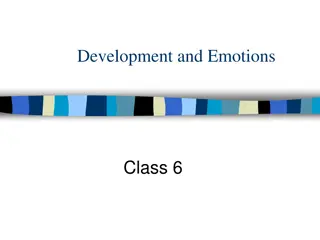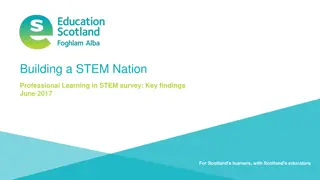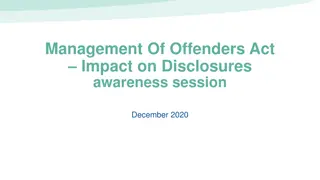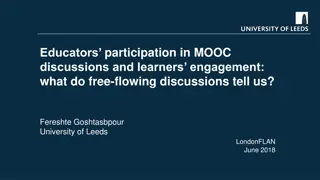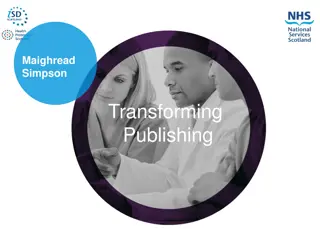Enhancing Emotional Attunement for Educators in Scotland
In this presentation, educators in Scotland are invited to explore the importance of emotional attunement in fostering trusting relationships with learners. The resource provides a framework for professional learning, including reflection on learners' perspectives on good teaching practices and strategies for enhancing emotional attunement. Facilitators can use these slides to promote discussion and self-directed learning activities to support educators in their continuous professional development journey.
Download Presentation

Please find below an Image/Link to download the presentation.
The content on the website is provided AS IS for your information and personal use only. It may not be sold, licensed, or shared on other websites without obtaining consent from the author.If you encounter any issues during the download, it is possible that the publisher has removed the file from their server.
You are allowed to download the files provided on this website for personal or commercial use, subject to the condition that they are used lawfully. All files are the property of their respective owners.
The content on the website is provided AS IS for your information and personal use only. It may not be sold, licensed, or shared on other websites without obtaining consent from the author.
E N D
Presentation Transcript
Inclusion Wellbeing & Equalities Professional Learning Framework Attunement being aware and responsive to emotions Level Informed @ESInclusionTeam For Scotland's learners, with Scotland's educators Do luchd-ionnsachaidh na h-Alba, le luchd-foghlaim Alba For Scotland's learners, with Scotland's educators Do luchd-ionnsachaidh na h-Alba, le luchd-foghlaim Alba
Interconnectivity For Scotland's learners, with Scotland's educators Do luchd-ionnsachaidh na h-Alba, le luchd-foghlaim Alba
Pause for Thought How to use this resource These slides can be used to facilitate professional learning in a group or whole setting, or as a self-directed learning activity as an individual. Facilitation notes are included at the bottom of each slide Please do not remove or change any of the slides included. Facilitators are welcome to add slides or activities relevant to your own setting, to support discussion and exploration of the topic. Facilitators will know their participants needs best. Anyone who works in an educational setting can be a facilitator and use these slides. For reflection or discussion activities, it is important to establish a safe space which encourages respect and honesty to ensure that everyone is able to participate. For Scotland's learners, with Scotland's educators Do luchd-ionnsachaidh na h-Alba, le luchd-foghlaim Alba
National Model for Professional Learning This professional learning resource will support you to deepen your knowledge and understanding. You will have the opportunity to consider how to take this learning forward on your own and with others. The National Model of Professional Learning (education.gov.scot) For Scotland's learners, with Scotland's educators Do luchd-ionnsachaidh na h-Alba, le luchd-foghlaim Alba
Pause for Thought Welcome This session provides an opportunity to: To reflect on what learners tell us makes a good teacher To understand why being emotionally attuned is important To learn how we can attune to a learner and use attunement to build trusting relationships To reflect on our own practice and explore our next steps in learning For Scotland's learners, with Scotland's educators Do luchd-ionnsachaidh na h-Alba, le luchd-foghlaim Alba
What learners have told us? Behaviour in Scottish Schools Research (2016) Learners highlighted the following aspects of their teacher s * manner and demeanour as being important : the teacher being happy the teacher smiling when you come in to class when the teacher is enthusiastic using humour being calm not shouting If a teacher is kind, it travels across the class and puts everyone in a good mood Children in Scotland study *In the survey they refer to teachers however the responses could equally apply to any practitioner working with any learner (child, young person or adult) Yougov survey (2018) What makes a good teacher? Learners (6-15yo) said: 27% Kind 8% Friendly 4% Caring 15% Listens 8% Engaging 3% Doesn t shout 13% Fun 7% Clear 10% Funny 6% Fair 9% Helpful 4% Patient 9% Knowledgeable 4% Strict For Scotland's learners, with Scotland's educators Do luchd-ionnsachaidh na h-Alba, le luchd-foghlaim Alba
The ability to share someone else's feelings or experiences by imagining Empathy what it would be like to be in that person's situation Supportive and healing relationships Is about giving emotionally appropriate Attunement responses For Scotland's learners, with Scotland's educators Do luchd-ionnsachaidh na h-Alba, le luchd-foghlaim Alba
Attunement being aware and responsive to emotions Attunement: describes how we recognise and respond to another person's emotional needs and moods is the process by which we form relationships Dr. Dan Siegel says, "Children need attunement to feel secure and to develop well, and throughout our lives we need attunement to feel close and connected. When working with others (learners, colleagues, parents/carers,..), attunement comes across as: genuinely caring about them truly listening to them and caring about their response noticing: when a they are in a mood, when they re unusually quiet, when they re struggling, . For Scotland's learners, with Scotland's educators Do luchd-ionnsachaidh na h-Alba, le luchd-foghlaim Alba
The Power of Connection Dr Bruce Perry 7.03 min From The Neurosequential Network If viewing as a PDF please click this link to watch the film https://youtu.be/oElS6AGwuxU For Scotland's learners, with Scotland's educators Do luchd-ionnsachaidh na h-Alba, le luchd-foghlaim Alba
Principles of attunement- the what and the why? (Based on Biemens Contact Principles) POSITIVE RELATIONSHIPS 6 WHAT WE DO TO BE ATTUNED HOW IT MAKES THE OTHER PERSON FEEL Deepening Discussion Helped to manage and learn 5 Open to learning and new ideas with support Guide & support 4 Attuned together - share thoughts An equal in the conversation - engaged 3 You have been listened to the other person is interested in you and in what you have to say Receiving - Listen with purpose 2 The other person is interested in what you think You are encouraged to offer your own ideas Encourage them to talk 1 Attending show them you notice how they are/feel Feel recognised and important For Scotland's learners, with Scotland's educators Do luchd-ionnsachaidh na h-Alba, le luchd-foghlaim Alba
Attunement principles (first 5) Schematic produced by: For Scotland's learners, with Scotland's educators Do luchd-ionnsachaidh na h-Alba, le luchd-foghlaim Alba
1 Being attentive Turning towards someone Looking at someone Making eye contact Using friendly intonations Using friendly facial expressions Using friendly postures For Scotland's learners, with Scotland's educators Do luchd-ionnsachaidh na h-Alba, le luchd-foghlaim Alba
The importance of non-verbal communication S quare O pen L ean forward E ye contact R elaxed or slightly angled no crossed arms or legs showing interest appropriate to the individual loose hands, relaxed shoulders Also consider personal space, height difference (sitting down if appropriate), using non-threatening gestures, For Scotland's learners, with Scotland's educators Do luchd-ionnsachaidh na h-Alba, le luchd-foghlaim Alba
2 Encouraging Giving them time to start to talk - waiting before jumping in Actively listening (see separate module) Showing emotional warmth through voice intonation Being friendly and/or playful in intonation and body language Naming what you notice about them Encouraging and eliciting further discussion (ah ha, yes, tell me more about that, ) For Scotland's learners, with Scotland's educators Do luchd-ionnsachaidh na h-Alba, le luchd-foghlaim Alba
3 Receiving Receiving with body language, matching or mirroring Being friendly and/or playful as appropriate Returning eye contact, smiling, nodding in response Showing you have heard, noted what they ve said Reflecting back the other s words or phrases Wondering aloud (I wonder if ) For Scotland's learners, with Scotland's educators Do luchd-ionnsachaidh na h-Alba, le luchd-foghlaim Alba
4 Attuned together To and fro - receiving and then responding - contributing equally Waiting attentively for your turn Having fun Giving and taking short turns (potentially a few times on each topic) Cooperating helping each other Checking understanding (their understanding of what you ve said and that you ve understood them) For Scotland's learners, with Scotland's educators Do luchd-ionnsachaidh na h-Alba, le luchd-foghlaim Alba
5 Guiding and supporting Scaffolding (for example, engage, simplify, problem solve, model enthusiasm) Extending the discussion by building on their responses Judging the amount of support required and adjusting Giving information and providing help (when needed) Offering choices that the other can understand Making suggestions that the other can follow For Scotland's learners, with Scotland's educators Do luchd-ionnsachaidh na h-Alba, le luchd-foghlaim Alba
6 Deepening the discussion Asking activating (thought provoking) questions Gaining their opinion Giving your opinion Checking for how your opinion and responses are being received Asking follow-up questions Naming (and allowing if appropriate) differences in opinion Always being prepared to go back a step (or 2) if necessary For Scotland's learners, with Scotland's educators Do luchd-ionnsachaidh na h-Alba, le luchd-foghlaim Alba
Things to remember: Every learner is different - To attune to a learner we must first observe and remember their unique style of engagement and communication, and their strengths and vulnerabilities, to be able to best respond to their individual needs The power of noticing - Try to notice changes in the non-verbal communication of learners, for example, facial expressions, tone of voice, level of activity in order to respond early to issues Be very aware of our own non-verbal communication particularly our facial expression as it could express interest, curiosity, joy, anger, or even disgust Remember due to our influential position, words, actions and expressions are magnified. Our criticism can feel crushing, but our approval can be motivating, energizing and powerful Being attuned to individuals within a group will also help us to respond to issues caused by the social dynamics of that group For Scotland's learners, with Scotland's educators Do luchd-ionnsachaidh na h-Alba, le luchd-foghlaim Alba
Further reading and viewing NHS Education Service and Children in Scotland, in consultation with children and young people have produced this wonderful resource: In the resource children and young people: tell us what they need from adults provide A Good Adult job description with Essential and Desirable Criteria Skills and Experience required Please take the time to look through the resource How to be a good adult | The Knowledge and Skills Framework (nhs.scot) https://www.digitallearningmap.nhs.scot/how-to-be-a-good-adult/ For Scotland's learners, with Scotland's educators Do luchd-ionnsachaidh na h-Alba, le luchd-foghlaim Alba
How can I use attunement to support engagement? ReflectionActivity (individually or as a group): How do I know when: Someone gets me? Someone cares about me? Someone thinks about me? How does it make me feel? Deepening Discussion Guiding & Supporting Becoming Attuned Together Receiving How could I develop attuned practice in my setting particularly for anyone who has experienced adversity and trauma? Encouraging Being Attentive For Scotland's learners, with Scotland's educators Do luchd-ionnsachaidh na h-Alba, le luchd-foghlaim Alba
Resources and Information to help For Scotland's learners, with Scotland's educators Do luchd-ionnsachaidh na h-Alba, le luchd-foghlaim Alba
Reflection From what you have learned so far, think about: How has this made you feel? What has this made you think about? What one action would you like to take forward? How can you link what you plan to do with others in your setting? How you will know that this learning has made a difference? For Scotland's learners, with Scotland's educators Do luchd-ionnsachaidh na h-Alba, le luchd-foghlaim Alba
We value your feedback From now until March 2024 we will be taking feedback on these resources so that we can make changes in advance of a formal launch of the Professional Learning Framework in June 2024 Your feedback could help us improve this resource Please complete this short form, using the link or QR code, to let us know what you thought of it and any suggestions you have on how it could be improved LINK: https://forms.office.com/e/b5PCpJJJ3P For Scotland's learners, with Scotland's educators Do luchd-ionnsachaidh na h-Alba, le luchd-foghlaim Alba
Education Scotland Denholm House Almondvale Business Park Almondvale Way Livingston EH54 6GA T +44 (0)131 244 5000 E enquiries@educationscotland.gsi.gov.uk For Scotland's learners, with Scotland's educators Do luchd-ionnsachaidh na h-Alba, le luchd-foghlaim Alba For Scotland's learners, with Scotland's educators Do luchd-ionnsachaidh na h-Alba, le luchd-foghlaim Alba
